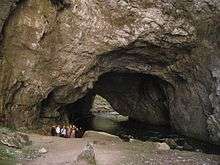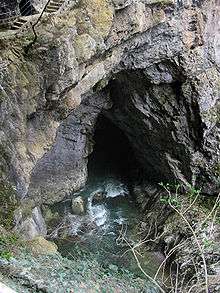Ponor

A ponor is a natural surface opening that may be found in landscapes where the geology and the geomorphology is characterized by some kind of karst.
Etymology
The term "ponor" has become the international geological term for larger karst-induced surface water inlets. The word derives from the proto-Slavic nora (pit, hole, abyss). The word "ponor" itself comes from a South Slavic languages in which word ponor has the same meaning.[1]
Description
Whereas a sinkhole is a depression (doline) of surface topography with a pit or cavity directly underneath, a ponor is kind of a portal where a surface stream or lake flows either partially or completely underground into a karst groundwater system. Steady water erosion may have formed or enlarged the portal in (mainly limestone) rock, in a conglomerate, or in looser materials.
Prevalence
Ponors are found worldwide, but only in karst regions. The entire Adriatic watershed within Bosnia and Herzegovina sits on Dinaric karst, with numerous explored and probably many more unexplored ponors and underground flows.[2][3]
There are also several places in southeast Europe (Bulgaria, Croatia, Czech Republic, Hungary, Romania, Montenegro, Slovenia) with the name "Ponor" due to associated karst openings. There are significant geological ponors in the Carpathian Mountains, the Dinaric Alps, Greece, Turkey, and parts of the southern United States.
 A ponor where the Reka River disappears into Škocjan Caves, Slovenia
A ponor where the Reka River disappears into Škocjan Caves, Slovenia Collecting basin, stone rake, ponor (behind viewer), Peloponnese
Collecting basin, stone rake, ponor (behind viewer), Peloponnese A Stubai Alps stream terminates in a ponor
A Stubai Alps stream terminates in a ponor A fenced-in ponor south of Grosuplje, Slovenia
A fenced-in ponor south of Grosuplje, Slovenia Closeup of ponor in Câmpeneasca cave near Izbuc village, Romania
Closeup of ponor in Câmpeneasca cave near Izbuc village, Romania
See also
References
- ↑ Samuel N. Dicken (November 1935). "Kentucky Karst Landscapes". The Journal of Geology. 43 (7). JSTOR. pp. 708–728.
Since local terms such as "sink," "sink hole", "kettle", "bottom", etc., are vague and confusing the Slovene terminology ("ponor", "doline", etc.) is used for the karst forms.
- ↑ "THE KARSTOGRAPHY OF THE DINARIC KARST IN BOSNIA AND HERCEGOVINA" (.html). devonkarst.org.uk. Devon Karst. Retrieved 4 September 2016.
- ↑ "home - The Devon Karst Research Society" (.html). www.devonkarst.org.uk. Devon Karst. Retrieved 4 September 2016.